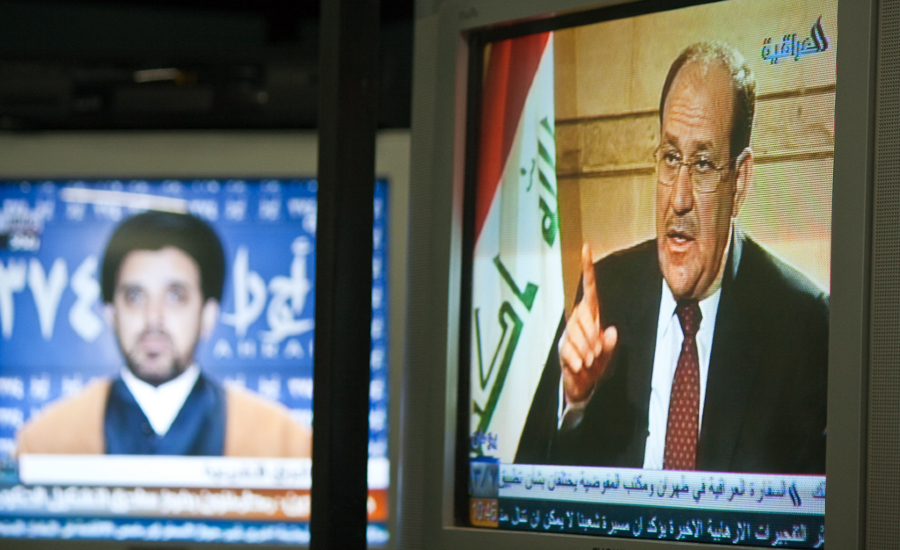How Saudi Arabia Pushed Iraq Into the Arms of Iran
There was an opportunity for a more productive relationship between Riyadh and Baghdad.

Published by The Lawfare Institute
in Cooperation With

Editor’s Note: The United States has long struggled to separate Baghdad from Tehran, trying to orient Iraq more toward moderate states in the Arab world. Katherine Harvey, the author of “A Self-Fulfilling Prophecy: The Saudi Struggle for Iraq,” contends that U.S. efforts failed in part because of Saudi Arabia’s counterproductive policies. Riyadh, she argues, rebuffed Iraqi efforts at a rapprochement, pushing the country closer to Iran.
Daniel Byman
***
Almost 20 years after the invasion of Iraq, and more than 10 years after the original U.S. withdrawal, the standard narrative of the Iraq War is now well established. President George W. Bush ordered the invasion expecting to find weapons of mass destruction and aspiring to establish a Middle Eastern democracy. Sunni and Shiite insurgencies immediately broke out, facilitated by Syria and Iran. The Iraqi Shiites came to power and gravitated away from the Arab world and toward Tehran. Nouri al-Maliki, deemed a sectarian ally of Iran, became prime minister and cemented Iraq’s position in an Iranian regional axis. Following the U.S. withdrawal in 2011, Iraqi Sunnis rose up against Maliki, providing an opening for the Islamic State to eventually take over a third of the country.
Saudi Arabia, meanwhile, barely figures in most accounts of the Iraq War. The few commentators who mention it explain in passing that the late King Abdullah despised Maliki and therefore refused to get involved. The lack of a Saudi presence in Iraq—the Saudis began to engage only after Abdullah’s death in 2015—has contributed to a widespread impression that the Saudis had little influence and were not much of a factor in Iraq in those years.
But that version of events is, quite simply, wrong.
First, it is critical to point out that Maliki was no Iranian loyalist. He was not a paragon of virtue—as premier he was authoritarian and often took highly sectarian positions—but he was an Iraqi nationalist. The irony is that Zalmay Khalilzad, then U.S. ambassador in Baghdad, quietly supported Maliki’s first bid for the premiership because, of the viable candidates, Khalilzad deemed that Maliki would be most acceptable to Iraq’s Arab neighbors. Like most of the Shiite Islamists who took positions of power in post-2003 Iraq, Maliki had fought Saddam Hussein’s regime from inside Iran during the 1980s. But his time there left him embittered toward the Islamic Republic, which manipulated, repressed and even killed members of his Dawa Party. Many Dawa members regarded themselves as an Iraqi exile group, not an Iranian tool. At the end of that decade, Maliki left Iran for Syria, where he remained until the 2003 invasion. A Lebanese journalist who interacted with Maliki in those years recalled to me how much Maliki disliked Iran at that time.
As a condition of his support, Khalilzad made Maliki agree that as premier he would engage with the Arab world, particularly Saudi Arabia, and Maliki traveled to the kingdom on his first trip abroad as prime minister in July 2006. But it seems likely that Maliki would have prioritized engagement with Saudi Arabia even if he had not promised Khalilzad. As a U.S. official who interacted with Maliki at that time explained to me, “Maliki was not pro-Iranian. He understood the need to balance Iran. And he understood that Saudi Arabia was the first address” to do so. Maliki himself told me that he chose Saudi Arabia as his first trip abroad because he believed that the symbolism of an Iraqi Shiite prime minister visiting the center of the Sunni Arab world would help quell the rising tide of sectarianism in Iraq. Sami al-Askari, a Maliki confidant, recounted to me that Maliki chose to travel to Saudi Arabia because he wanted to signal that Iraq was, at its core, an Arab country.
On that trip, Maliki was warmly received by the Saudi leadership and met with King Abdullah, but afterward Abdullah refused to meet with him ever again. Abdullah called Maliki a liar who had made him promises he failed to keep, and became convinced that he was an Iranian agent. All of my sources told me that Abdullah believed Maliki had lied, but none of them—including Americans, Saudis, and Iraqis who interacted with the Saudi king and his top advisers—could ever tell me what Abdullah believed Maliki had lied about. Abdullah’s claim was very vague, and I never found evidence to substantiate it. What I did find was that plenty of aggrieved Iraqis had access to the Saudi leadership, and at least some of them seemed to have passed disinformation to the Saudis, alleging that Maliki was carrying out Iranian orders. Perhaps this disinformation was the source of Abdullah’s claim.
The truth is that, as a Saudi royal family insider told me, Abdullah “could not comprehend” what was going on in Iraq in those years. For decades, the Saudi leadership have been convinced that Iran has expansionist designs in the Arab world and have viewed Arab Shiite communities as potential pawns of Iran—a standard stereotype of the Shiites among Sunnis. Given these beliefs, the Saudis concluded practically as soon as Saddam Hussein’s regime fell that the United States had handed Iraq to Iran on a silver platter. Abdullah was deeply upset by U.S. efforts in Iraq—efforts that naturally allowed the Shiite majority to rise to power—long before Maliki became prime minister. Maliki simply served as a convenient scapegoat for Abdullah’s ire.
These beliefs blinded Abdullah to the steps Maliki was taking in his first government to pursue an independent path from Iran. In 2008, Maliki undertook Operation Charge of the Knights, which targeted Iranian-backed proxies and earned him major plaudits from Iraqi Sunnis and U.S. officials. In 2009, he refused to join an Iranian-backed electoral coalition to form his own nationalist list for the 2010 parliamentary elections. To clarify, Maliki was not anti-Iranian. Iran necessarily has significant influence in any Shiite-led Iraq, and Maliki desired a positive relationship with Tehran. In his first government, he never spoke out explicitly against Iran. But he was also willing to resist Iranian pressure, as he did prior to the 2010 elections, to ensure his country did not become subservient to Tehran.
Meanwhile, from 2006 through early 2009, Maliki attempted to establish an opening to Saudi Arabia, albeit with diminishing hope of success. While the Saudis refused to engage, many of Iraq’s other Arab neighbors began to do so. By 2008, top officials from Egypt, Jordan, the United Arab Emirates, Syria and Lebanon were traveling to Baghdad. But with the Saudis so standoffish, there was only so far that these other Arab states were willing to go. Nor could the U.S. change the Saudis’ calculus—the Bush and Obama administrations both tried, and failed, to push Abdullah to engage.
The problem was that Abdullah’s rejection of Maliki ended up producing a self-fulfilling prophecy. Abdullah refused to engage with him or have anything to do with his government because he believed Maliki was an untrustworthy Iranian agent—but it was Abdullah’s refusal to accept him that ultimately pushed Maliki toward Iran.
Many Iraqis came to regard Abdullah’s intense hostility to Iraq’s new order, symbolized by his rejection of Maliki, as a Saudi intention to reverse the Shiite ascendance. Iraqi Shiites, wary of losing their newfound political power, began to feel deeply threatened by the Saudis. Saudi Arabia reportedly began financing Maliki’s political rivals as early as 2007. In particular, Abdullah backed Ayad Allawi, a secular Shiite and former Baathist who had been Iraqi prime minister in 2004 and 2005. For many Shiite Iraqis, Allawi represented a return to Iraq’s old order. Abdullah’s support for Allawi in the 2010 election led Maliki, in a reversal of his earlier behavior, to seek Iranian assistance in the aftermath of those elections to retain the premiership. The Syrian civil war then cemented the alliance between Maliki and Iran. Maliki was convinced that the Saudis were working to overthrow not only the Bashar al-Assad regime in Damascus, but also his government in Baghdad. His government therefore facilitated Iranian assistance to Assad because they believed that if Assad fell, they would be next.
Maliki’s anxiety seems to have been justified. Whatever the Saudis were in fact doing in Iraq in those years, a Saudi royal family insider confided to me that “Abdullah was willing to do whatever it took to get rid of Maliki.”
Commentators on the Middle East frequently point out that Iran sees itself as in charge of four Arab capitals—Baghdad, Beirut, Damascus and Sanaa. At least in the case of Baghdad, it was not a foregone conclusion that a Shiite-led Iraq would fall into Iran’s orbit. For years, Maliki tried to establish independence from Iran. He changed course not out of some affinity he held for the Islamic Republic, but because of the deep alienation he felt toward Saudi Arabia.
This pattern has repeated itself in Yemen and Lebanon. The war the Saudis started against the Houthis in 2015 transformed that group’s limited ties to Iran into a real alliance. Recent Saudi moves against Lebanon, such as imposing an export ban and expelling its ambassador, do little to enhance Lebanese political factions’ ability to stand up to Hezbollah but deepen the country’s already considerable economic misery. In all these cases, Saudi Arabia’s approach has been self-defeating. The Saudis have pushed these countries away as the Iranians have simultaneously pulled them in. The Saudis almost never pass up an opportunity to call the Iranians expansionist, but they themselves have been responsible for fueling no small part of Iran’s expansion. This has been their self-fulfilling prophecy at work.





